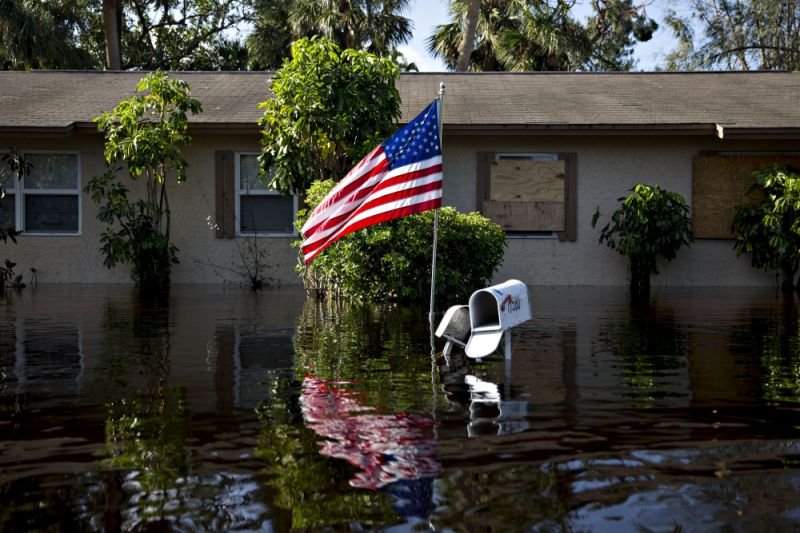
Date: 2024-12-21 Page is: DBtxt003.php txt00016167
Climate Change
Costs are Growing
Corporate America Tallies the Mounting Costs of Climate Change
Burgess COMMENTARY
Peter Burgess
Corporate America Tallies the Mounting Costs of Climate Change

(Bloomberg) -- Bank of America Corp. worries flooded homeowners will default on their mortgages. The Walt Disney Co. is concerned its theme parks will get too hot for vacationers, while AT&T Inc. fears hurricanes and wildfires may knock out its cell towers.
The Coca-Cola Co. wonders if there will still be enough water to make Coke.
As the Trump administration rolls back rules meant to curb global warming, new disclosures show that the country’s largest companies are already bracing for its effects. The documents reveal how widely climate change is expected to cascade through the economy -- disrupting supply chains, disabling operations and driving away customers, but also offering new ways to make money.
The disclosures were collected by CDP, a U.K.-based nonprofit that asks companies to report their environmental impact, including the risks and opportunities they believe climate change presents for their businesses. More than 7,000 companies worldwide filed reports for 2018, including more than 1,800 from the U.S.
On Tuesday, CDP, formerly known as the Carbon Disclosure Project, released letter grades for those companies that measure “how aware they are about the issue, how they’re managing it, how they’re progressing toward targets,”said Caroline Barraclough, a CDP spokeswoman. Thirty U.S.-based companies got an “A” grade, the most of any country; they include Apple Inc., Johnson & Johnson and Home Depot Inc. Next on the list were Japan, with 25 top-scoring companies, and France with 22.
The information companies provide to CDP about their climate risk is typically far more specific than what they include in their filings to the U.S. Securities and Exchange Commission. And while the SEC requires companies to disclose material risks, it doesn’t ask them to address the specific threats associated with climate change.
Most of the largest U.S. companies by market capitalization submitted information to CDP, and the vast majority say the threat is real and serious: Of the 25 companies whose submissions were reviewed by Bloomberg, 21 said they had identified “inherent climate-related risks with the potential to have a substantial financial or strategic impact” on their business.
Many of those risks related to the effects of climate change on companies’ ability to operate. One of the most commonly cited risks was not enough water.
“Many of Intel’s operations are located in semi-arid regions and water-stressed areas, such as Israel, China and the southwestern United States,” warned Intel Corp. If climate change causes longer droughts in those areas, it could “potentially lead to increased operational costs since the semiconductor manufacturing process relies on access to water.”
Water shortages could also threaten Coke’s business, the company said, because climate change “could limit water availability for the Coca-Cola system’s bottling operations.”
More frequent hurricanes and wildfires could force AT&T to spend more money on repairing damage to its network, as well as “proactively relocating equipment or additional network hardening.” The company noted that disasters cost it $627 million in 2017.
Rising temperatures are already affecting “the comfort and health and well being of customers” in its theme parks, Disney wrote. “If measures are not taken to ensure low cost alternatives for cooling and managing extreme temperatures, this will not only negatively impact our customers experience, it will also impact our ability to attract and retain visitor numbers.”
Other companies said climate change may affect their customers. Bank of America reported that 4 percent of its U.S. real estate-secured loans are in flood zones, almost all of them residential.
“Increased flood incidence and severity could lead to our clients defaulting on their mortgage payments if, for example, flood insurance premiums become unaffordable,” the company wrote. “Clients may also find themselves in a negative equity situation due to housing values being impacted when insurance costs rise.”
Visa Inc. warns that global warming could increase global pandemics and armed conflict -- problems that would in turn cause fewer people to travel.
“Any such decline in cross-border activity could impact the number of cross-border transactions we process and our foreign currency exchange activities, and in turn reduce our revenues,’’ Visa wrote.